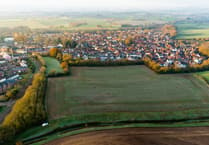ENDANGERED Atlantic salmon could be wiped out in the Bristol Channel once the new Hinkley Point C nuclear power station starts generating electricity, campaigners fear.
They believe the estuary’s migrating salmon population could be decimated by huge water cooling intakes serving the power station’s nuclear reactors.
The Missing Salmon Alliance (MSA), which is a collective of passionate conservation organisations with a common interest in improving the plight of Atlantic salmon, is demanding greater fish protection measures by Hinkley C’s owner EDF.
They accused EDF of ‘flagrant disregard’ for major fish kill potential if it was successful in a bid to drop a requirement to fit acoustic fish deterrents (AFDs) on the water intake heads on the bed of the estuary.
Consultation on Hinkley’s proposals to drop the AFDs ended on Thursday (February 29) and MSA said it understood the system was now unlikely to be used.
As mitigation for the removal of the AFDs, EDF had suggested compensatory creation of wetland habitat for birds and other species, and enhancements to fish passage on some existing weirs.
But MSA said Hinkley would draw a huge amount of water from the Bristol Channel to cool its reactors, about 120,000 litres per second.
A spokesperson said: “This is the equivalent of three Olympic swimming pools per minute and twice the average flow of the River Thames, in London.
“An independent panel warned in 2021 the power station could capture up to 182 million fish per year. It is likely that most of these will not survive.”
The area surrounding Hinkley is a Special Area of Conservation with a number of rivers which are home to endangered, protected, and commercially important fish, including Atlantic salmon, shad, elver eel, which is critically endangered, conger eel, brown shrimp, cod, bass, whiting, flounder, sole, and thornback ray.
The Severn has one of only four UK spawning populations of twait shad and data showed a significant risk of Hinkley wiping them out as nearly one-third of their population used the sea around the abstraction zones.
The International Union for Conservation of Nature (IUCN) classifies Atlantic salmon as ‘endangered’ in Great Britain and ‘near threatened’ on a global scale.
Game and Wildlife Conservation Trust head of fisheries Dylan Roberts said: “Wild Atlantic salmon migrate through the Bristol Channel each spring from a number of recognised rivers in the area.
“It is critical a real-time assessment of salmon smolts migrating through the area is funded by EDF.
“This is not solely about salmon, it is a much broader remit.
“It is about conserving our wider biodiversity against a massive State project steamrolling through and putting two fingers up to the environment.”
Angling Trust head of campaigns Stuart Singleton-White said: “What EDF propose in terms of compensation is inadequate.
“It will not compensate for the millions of fish sucked in by these intakes every year.
“It will decimate Atlantic salmon and shad.
“Without proper compensation and mitigation, they could become locally extinct.”
EDF said the number of fish likely to be affected by the cooling water system without an AFD equated to less than half of the annual catch of one average-sized UK trawler.
Hinkley C head of environment Chris Fayers said it was the first power station on the Severn to have fish protection measures in place.
He said: “Despite scientific evidence that the remaining impact on fish is ‘very small’, the project supports further effective, proportionate, and practical compensation measures.
“Resolution of this issue matters.
“The project is one of Britain’s biggest acts for the environment, built to meet exacting environmental standards.”
EDF said it listened carefully to the views of the community and the environmental organisations in its consultation on proposals for a 750-acre salt marsh and smaller areas of seagrass, kelp forest, and oyster bed.
AFDs involved 278 speakers making a sound louder than a jumbo jet and causing 60 years of noise pollution to marine wildlife and threaten the lives of divers for decades to come.
Mr Fayers said: “We are proposing to make improvements to rivers to support migratory fish like salmon.
“However, wider improvements are required to protect the health of our rivers from other dangers, including pollution from sources such as poultry farms.”




